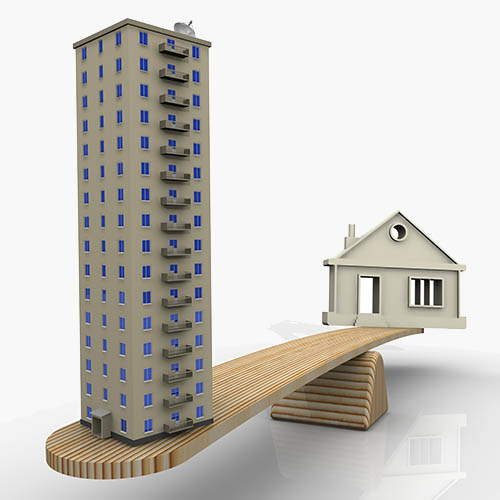Leasehold – a system unique to England and Wales – has been in the news a great deal in 2017 as the government considers banning its use in the purchase of houses but it is of course, a commonplace way to purchase an apartment.
It’s a good reason to look into the details of what leasehold is, what it is used for, its advantages and disadvantages and many other aspects of this form of legal property ownership.
What does leasehold mean?
Buying a property through leasehold gives the purchaser ownership of the property and its land for the period of the lease – a legal contract with the freeholder of the property and land. When the lease comes to an end, the ownership returns to the freeholder (aka the landlord), though there may be an option to extend the lease.
Dan Lowery, director of Romans Surveyors says: “The leasehold homeowner (“lessee”) has a lease with the landlord which states how many years they own the property and what restrictions may be imposed on how they live in the property such as whether pets are allowed or whether they can make substantial alterations.”
In England and Wales, leasehold is a very common way of buying flats and maisonettes, though this is not so in Scotland.
What is the difference between freehold and leasehold property?
 A freeholder owns the building and the land it stands on outright forever (“in perpetuity”, in legalese). The freeholder is named in the Land Registry, owning the “title absolute”. There’s no ground rent for the freeholder to pay, but he/she is responsible for maintaining the fabric of the building, in other words, the outer walls and roof.
A freeholder owns the building and the land it stands on outright forever (“in perpetuity”, in legalese). The freeholder is named in the Land Registry, owning the “title absolute”. There’s no ground rent for the freeholder to pay, but he/she is responsible for maintaining the fabric of the building, in other words, the outer walls and roof.
With leasehold, you have a contract with the freeholder for a length of time, which sets down the legal rights and responsibilities of either side. Typically (though this is not set in stone legally), the freeholder will look after the fabric of the building, with the leaseholder paying maintenance fees, annual service charges and a share of the buildings insurance, as well as an annual ground rent.
Leaseholders will need permission from the freeholder for major works to the property, for example an extension, and may have to live with restrictions on areas such as subletting and pet ownership. If the terms of the contract are not fulfilled by the leaseholder, then the lease can become forfeit.
What is ground rent?
Ground rent provides a regular income to the freeholder from the leaseholder, though in many cases it can be very small. It is generally payable annually, six-monthly or quarterly, and can be fixed or escalating. It is escalating ground rents on leasehold houses that have become headline news in recent years.
An example of a reasonable ground rent on a 99-year lease for an apartment might see the ground rent set at £50 a year for the first 33 years, increasing to £100 per year for the next 33 years, then £150 per year for the final 33 years of the lease.
Ground rent may not be demanded in the lease at all, but if it is and the leaseholder does not pay it, the leaseholder can be taken to court by the landlord/freeholder to recover the money.
How long should a lease be?
Leases are often 90-120 years long, but can be much longer – 999 years is not uncommon when buying a new build flat. A long-distant expiry date should ensure no difficulty when it comes to the lessee securing a mortgage for the property, but if the lease is under 70 years, you might struggle with many lenders, as they need leases to run for at least 25-30 years beyond the end of the mortgage.
You’ll also need to consider the likely number of years left on the lease when you come to sell it, as you may have difficulties finding a buyer at that time for the very same reason. At least 80 years left is recommended.
What happens when a lease runs out on a leasehold property?
When the lease expires, the property returns to the landlord/freeholder. In practice, however, most lessees renew their lease long before it expires. “The length of a lease can affect the value of a property,” says Lowery. “Typically the shorter the lease, the lower the asking price. On the whole, when the lease gets past 90 years, it is usually a good time to start looking into extending it.”
Can you extend or end a lease?
 The law says leaseholders can ask their landlord to extend the lease at any time, and that once you’ve owned your home for two years and you are a “qualifying tenant” – that is, your original lease was for a term of more than 21 years – you have the right to extend your lease by 90 years on a flat and 50 years on a house.
The law says leaseholders can ask their landlord to extend the lease at any time, and that once you’ve owned your home for two years and you are a “qualifying tenant” – that is, your original lease was for a term of more than 21 years – you have the right to extend your lease by 90 years on a flat and 50 years on a house.
What are the extension costs of a leasehold property?
The freeholder can charge for this extension and the cost will depend on the property. You can get an estimate of the cost of the ‘premium’ of extending the lease on this Leasehold Advice Service calculator. This estimates that on a lease for property currently worth £200,000 and with a ground rent of £300 per annum, if the lease has 120 years remaining, the premium might be £5,000 to 6,000; if 90 years remaining, £6,000 to £8,000; but if only 50 years remaining, this rockets to a possible £34,000 to £37,000.
Lowery confirms: “Once the term falls below 80 years the costs to extend can increase significantly, and if selling is part of your plan, this can affect the asking price and whether a buyer can get a mortgage on the property or not – which limits potential buyers.”
Recent research from the London School of Economics, analysing 8,000 sales of leasehold properties, found many people may beoverpaying to extend their lease because of flaws in the valuation process, so it is worth taking time to ensure you are paying a reasonable sum.
Louie Burns of Leasehold Solutions, a company that specialises in project managing lease extensions and freehold purchases, says: “We continue to have serious reservations about the flawed valuation models used to calculate the cost of lease extensions and freehold acquisitions, which unfairly benefit freeholders and cause misery and profound financial hardship for many flat owners.”
If you are unable to agree the cost of extending the lease with the freeholder, you can appeal to the to a First-Tier Tribunal (Property Chamber), though you may need to pay for the services of a solicitor and surveyor for that.
Considerations of selling a leasehold property
When it comes to selling your leasehold property (selling the remaining term of the lease is called “assignment” in legalese), there are a number of considerations to bear in mind.
- Usually, you’ll need the prior written consent of the landlord/freeholder before you sell it (“consent for sale”).
- Alternatively, the buyer’s solicitor must notify the landlord (and/or the agent) within 28 days of the sale.
- Have documents relating to the management of the building to hand, to save time and money. This includes possible share certificates, accounts/budgets/recent demands for service charges, correspondence on proposed major works on the building, legal documents and meetings minutes for your residents’ management company (if there is one), and any additional regulations for the building not in the lease itself.
- You must ensure that the buyer enters into a deed of covenant with the landlord/managing agent or management company so that the latter has a direct contract with the buyer and prior notification of the new lessee.
- Fees you may have to pay the managing agents include a fee for registering the deed of covenant or granting consent and assignment of the lease, and costs for time relating to duties such as getting consent for sale (if needed), deeds of covenant, registration of the sale, registration of the mortgage, and even answering queries by email/phone/letter.
- You will need to pay all outstanding debts, or legally commit to settle them, before the sale in completed, for example the appropriate proportions of the service charges and ground rent.
- With many blocks of flats owned by the lessees, leaseholder owners are often shareholders of a company and must ask their solicitor to hand over their share certificate or sell membership of the company when you sell.
Advantage and disadvantages of a leasehold property
As with many aspects of property ownership, there are pros and cons to purchasing a leasehold property. In summary:
The advantages
- Could be less expensive than an equivalent freehold.
- Better for people needing short-term accommodation.
- Often, fewer responsibilities for repairs and maintenance.
- The possibility of buying the property outright.
The disadvantages
- Limited years of the lease may hinder getting a mortgage and/or the resale of the property.
- Possible conditions to limit the way you can use the property, for example subletting or pet ownership.
- The landlord is not obliged to grant your request for renewal when the lease expires.
- The landlord has control over the service charges that you must pay.
Questions to ask when buying a leasehold property
 There are some essential questions to ask before committing to purchase a leasehold property
There are some essential questions to ask before committing to purchase a leasehold property
- How long is left on the lease? The cost of extending a lease increases rapidly when the term left on it drops under 80 years, and the lease reaching this point could hinder your chances of selling the property.
- How much is the management information pack? The management information pack is provided by the freeholder (or the managing agents on their behalf) to provide important information about the property and the freeholder. Though this unregulated product is paid for by the vendor, note the price as it may affect you when you come to sell. These packs often cost up to £500 + VAT.
- How much is the ground rent? While often a fairly small amount – maybe £100 to £200 per year – look out in the lease for escalating ground rent, for example that may double every 10 or 20 years for the length of the agreement.
- How much is the service charge and what does it include? This is very variable – maybe less than £1,000, perhaps several thousand – and usually covers building repairs, maintenance and insurance, and could also include communal area cleaning and lighting, concierge/caretaker salaries, central heating and lifts. It may also cover contributions towards a reserve (or “sinking fund”)
- Is the vendor in arrears for property charges? Any arrears owed by a seller will become your responsibility following completion. Don’t rely on being able to sue the vendor for breach of contract.
Who insures a leasehold property?
It is usually the freeholder who pays to insure the fabric of the building, but that is then reimbursed proportionally by all the leaseholders.
Jeremy Raj, partner and property expert at Wedlake Bell solicitors told This is Money: “The starting point to understanding all relationships between freeholders and leaseholders is the lease itself. Amongst other things, the lease will set out the rights, duties and obligations of each of the parties to it; who does what, and who pays for it.
“So, if your lease states that the freeholders must organise the insurance of the whole building, and that you must reimburse them for your part of the cost of doing so (most leases do say this) then in principle, that is what must happen.”
How to buy a freehold if you own a leasehold?
Burns says: “There are two different ways to buy the freehold of your home. Firstly, leaseholders have the legal right to buy their freehold under the Leasehold Reform Act (1967). If the freeholder will not agree to negotiate fairly, homeowners have a legal right to force them to and are offered legal protection on the terms of the freehold purchase. To many people this process may seem daunting and uncertain, and understandably people shy away from it.
“The other option is to contact the freeholder directly and ask them how much they want to sell the freehold. This is called an ‘informal’ deal and it is often the worst decision that a leaseholder could possibly make, because to do so means they have no legal protection whatsoever under statutory legislation. This is one instance where ‘no deal’ really is better than a bad deal.”
Leasehold on houses
Where leasehold is very common on apartments, it is much less so on houses, where purchasers expect to get the freehold as they are buying the only property on the plot of land.
A number of UK housebuilders have been selling houses under leasehold rather than freehold and not been making clear to buyers that these are the terms of the purchase. Afterwards, buyers have found out they are liable to ground rents that may rise dramatically every 10 years, to the point where after a short period of time the house might be deemed unsaleable, with the price of purchasing the freehold also excessively high.
This is a topic that started to hit the news in a big way in 2016, to the point where the government promised to revise current law in the opening of Parliament following the 2017 general election, with communities secretary Sajid Javid announcing an eight-week consultation in July 2017 with proposals to ban the sale of houses on leasehold.
Be sure to check – and get your solicitor to double-check – that you are not buying this way or that if you are, you are completely aware of the financial implications. The simplest advice may be – don’t do it.